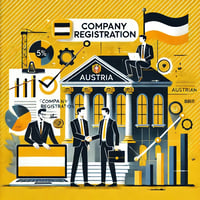
Steps to Set Up a Company:
Austria
Choose a Business Structure
- Sole Proprietorship (Einzelunternehmen): Single owner, full liability.
- General Partnership (Offene Gesellschaft - OG): Two or more partners, shared liability.
- Limited Partnership (Kommanditgesellschaft - KG): General and limited partners.
- Private Limited Company (Gesellschaft mit beschränkter Haftung - GmbH): Separate legal entity, limited liability.
- Public Limited Company (Aktiengesellschaft - AG): Separate legal entity, limited liability, suitable for large businesses.
- Foundation (Stiftung): Legal entity without shareholders, often used for non-profit purposes.
- Association (Verein): Membership-based organization, often for non-profit purposes.
Open an Austrian Bank Account
- Set Up a Business Bank Account: Necessary for managing business finances.
Obtain Necessary Licenses and Permits
- Check Industry-Specific Requirements: Depending on the nature of your business, you may need specific licenses or permits.
Laws and Regulations to Consider
Corporate Law
- Dutch Civil Code (Burgerlijk Wetboek): Governs the formation and operation of companies.
- Company Law (Wet op de Ondernemingsraden - WOR): Governs employee participation in company decision-making processes.
Tax Law
- Corporate Income Tax Act: Sets the rules for corporate income taxation.
- Value Added Tax (VAT) Act: Governs VAT regulations.
- Payroll Tax Act: Governs the withholding and payment of payroll taxes.
Laws and Regulations to Consider
Corporate Law
- Austrian Civil Code (Allgemeines Bürgerliches Gesetzbuch - ABGB): Governs the formation and operation of companies.
- Austrian Company Code (Unternehmensgesetzbuch - UGB): Governs business operations and accounting.
Tax Law
- Corporate Income Tax Act: Sets the rules for corporate income taxation.
- Value Added Tax (VAT) Act: Governs VAT regulations.
- Payroll Tax Act: Governs the withholding and payment of payroll taxes.
Employment Law
- Employment Contracts Act: Governs the terms and conditions of employment contracts.
- Collective Labor Agreements (Kollektivverträge): Industry-specific agreements that may apply to your business.
- Employee Protection Act (ArbeitnehmerInnenschutzgesetz - ASchG): Sets health and safety standards for workplaces.
- Austrian Labour Constitution Act (Arbeitsverfassungsgesetz - ArbVG): Governs the rights of employees and employers.
Register Your Company
- Choose a Company Name: Ensure it is unique and follows naming regulations.
- Draft Articles of Association: Required for GmbH and AG, outlining the company’s structure and rules.
- Notarize the Articles of Association: For GmbH and AG, this must be done by an Austrian notary.
- Register with the Austrian Commercial Register (Firmenbuch): Obtain a registration number.
- Register for Taxes with the Austrian Tax Office (Finanzamt): Obtain a VAT number if applicable.
Comply with Austrian Employment Laws
- Employment Contracts: Draft contracts that comply with Austrian labor laws.
- Register with the Social Security Administration (Sozialversicherung): Ensure compliance with social security contributions.
- Health and Safety Regulations: Adhere to Austrian health and safety regulations in the workplace.
Accounting and Reporting
- Set Up an Accounting System: Maintain accurate financial records.
- Annual Financial Statements: Prepare and file annual financial statements.
- Corporate Tax Returns: File corporate tax returns annually.
Environmental Law
- Environmental Management Act (Umweltmanagementgesetz): Governs environmental protection and sustainability practices.
Intellectual Property Law
- Trademark Act: Governs the protection of trademarks.
- Patent Act: Governs the protection of patents.
By following these steps and adhering to the relevant laws and regulations, you can successfully establish and operate a company in Austria. It’s advisable to consult with legal and financial experts to ensure full compliance and smooth setup.
Data Protection Law
- General Data Protection Regulation (GDPR): EU-wide regulation governing data protection and privacy.
- Austrian Data Protection Act (Datenschutzgesetz - DSG): National implementation of GDPR.
Setting up a company in Austria can be highly advantageous in several circumstances. Here are some key reasons and situations when it would be beneficial to establish a company there:
1. Strategic Geographic Location
- Central Europe Access: Austria’s central location in Europe provides easy access to both Western and Eastern European markets, making it an ideal hub for businesses looking to expand across Europe.
- Excellent Transport Infrastructure: Austria boasts a well-developed infrastructure, including efficient road, rail, and air transport networks, facilitating smooth logistics and transportation.
2. Business-Friendly Environment
- Stable Economy: Austria has a stable and prosperous economy with a high standard of living, providing a secure environment for businesses.
- Favorable Business Regulations: The country offers a business-friendly regulatory environment with clear and transparent legal processes.
3. Highly Skilled Workforce
- Educated Workforce: Austria has a highly educated and skilled workforce, particularly in sectors like engineering, technology, and manufacturing.
- Multilingual Population: Many Austrians speak multiple languages, including English, which is beneficial for international business operations.
4. Strong Support for Innovation
- Research and Development Incentives: Austria provides various incentives and funding opportunities for research and development activities, promoting innovation and technological advancements.
- High-Quality Research Institutions: The country is home to numerous high-quality universities and research institutions, fostering a strong innovation ecosystem.
5. Tax Advantages
- Competitive Corporate Tax Rate: Austria offers a competitive corporate tax rate, along with various tax incentives for businesses engaged in R&D and other qualifying activities.
- Double Tax Treaties: Austria has an extensive network of double tax treaties with numerous countries, reducing the risk of double taxation.
6. Robust Legal Framework
- Strong Legal Protection: Austria’s legal system provides strong protection for intellectual property, contracts, and business operations.
- Transparent Regulatory Environment: The country has a transparent and predictable regulatory environment, ensuring legal certainty for businesses.
7. High Quality of Life
- Attractive Living Conditions: Austria offers a high quality of life, excellent healthcare, and a vibrant cultural scene, making it an attractive location for expatriates and international employees.
- Work-Life Balance: Austrian culture places a strong emphasis on work-life balance, contributing to a satisfied and productive workforce.
8. Access to European Markets
- EU Membership: Being a member of the European Union (EU), companies in Austria benefit from access to the EU single market, which includes over 450 million consumers.
- Free Trade Agreements: Austria benefits from EU trade agreements with numerous countries worldwide, facilitating international trade.
When to Consider Setting Up a Company in Austria:
- Central European Market Entry: If you are looking to enter or expand in the Central European market, Austria provides a strategic and efficient entry point.
- Innovation and R&D: Companies focusing on innovation and research can benefit from Austria’s strong support for R&D activities and the availability of funding and incentives.
- Manufacturing and Engineering: Austria’s highly skilled workforce and advanced infrastructure make it an ideal location for manufacturing and engineering companies.
- Stable Economic Environment: Businesses seeking a stable and secure economic environment will find Austria’s economic and political stability advantageous.
- High Quality of Life for Employees: If attracting and retaining international talent is important, Austria’s high quality of life and work-life balance can be significant advantages.
By considering these factors and aligning them with your business goals, you can determine if setting up a company in Austria is the right move for your organization. Consulting with local experts and advisors can further help in making an informed decision.

Step-by-Step Guide: How to set up a Company
Setting up a company involves a series of crucial steps that require careful planning and execution. From choosing the right business structure to understanding legal and tax obligations, each stage is vital to the successful launch and operation of your business. This step-by-step guide provides a comprehensive overview of the key processes involved in establishing a company, ensuring you have the knowledge and tools needed to navigate the complexities of business formation.
